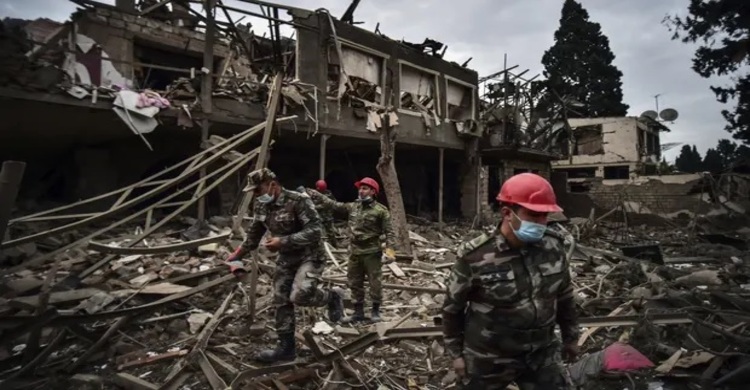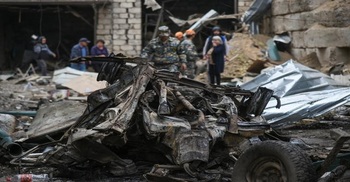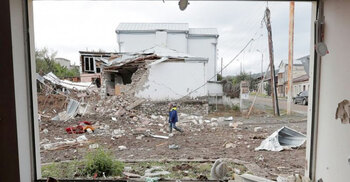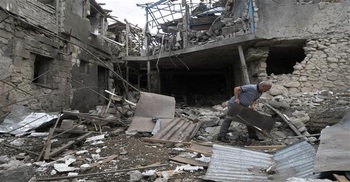Russia calls on Armenia, Azerbaijan to respect ceasefire

Russia has made a fresh appeal to Armenia and Azerbaijan to respect a badly fraying ceasefire in the breakaway South Caucasus region of Nagorno-Karabakh, with both sides blaming each other for fresh attacks, including on civilians.
The truce was supposed to come into force last Saturday but appears to be failing, with the defence ministry in Nagorno-Karabakh – a territory inside Azerbaijan but governed by ethnic Armenians – accusing Azeri forces of launching artillery and rocket attacks in several areas, and claiming to have shot down an Azeri Su-25 fighter jet, though Azerbaijan denies this.
Baku has in turn accused Armenian forces of attacking Azeri army positions on the ceasefire line that divides the two sides and says several regions inside Azerbaijan have taken artillery fire, resulting in one new civilian death and several wounded, including Azeri journalists.
Both sides have denied breaking the ceasefire, though not unequivocally. Azerbaijan said on Wednesday it reserved the right to hit any military installations that targeted civilians and to repel movements into its territory.
The Russian defence minister, Sergei Shoigu, made the new appeal for peace by telephone to the Azeri and Armenian defence ministers, urging the countries to “fully meet the commitments” made under the humanitarian ceasefire brokered by Moscow.
The ceasefire is buckling despite mounting calls from world powers to halt the fighting, which has killed more than 500 people since the decades-old conflict flared on 27 September. International groups have warned of a humanitarian crisis, with people forced from their homes and a growing Covid-19 pandemic.
The fighting is the worst since a 1991-94 war over Nagorno-Karabakh that killed about 30,000 people. It is being closely watched abroad, partly over fears that Russia and Turkey could be sucked in. Russia has a defence pact with Armenia, and Turkey is allied with Azerbaijan.
In an interview with Reuters on Tuesday, Armenia’s prime minister, Nikol Pashinyan, accused Turkey of muscling its way into the South Caucasus region to further what he called its expansionist ambitions.
Turkey has denied this and says Armenian forces must withdraw from Nagorno-Karabakh to resolve the conflict.
The “Minsk Group” – set up by the OSCE security watchdog in 1992 to help mediate in Nagorno-Karabakh – called on the Armenian and Azeri leaders on Tuesday to implement the ceasefire to prevent “catastrophic consequences for the region”.
The 11-member group is led by the US, Russia and France. Turkey is also a member but not involved in the Nagorno-Karabakh talks, though it has said it wants to join them.
The Azeri president, Ilham Aliyev, said on Wednesday that Turkey should be involved in peace talks and that the conflict could not be solved without Ankara’s involvement.
In an interview with the Turkish broadcaster Habertürk, Aliyev also said Turkish F-16 jets were in Azerbaijan, but that they were not being used in the Nagorno-Karabakh conflict between Azeri and ethnic Armenian forces.
Though Russia has sought to play a mediating role, there are fears it could be dragged in should the conflict escalate. Moscow has a military treaty that calls for it to assist Armenia should its sovereignty be threatened – though it has made clear it does not regard defending Nagorno-Karabakh as part of its obligations.
Oil-rich Azerbaijan is thought to be better resourced to fight a drawn-out conflict, which it could use to draw concessions from Armenia. But Yerevan could also raise the stakes by recognising the independence of Nagorno-Karabakh and openly attacking Azerbaijan from its territory, including with high-precision Iskander surface-to-surface missile systems supplied by Russia. A larger-scale war would be likely to draw greater international engagement by increasing the risk of damage to the oil and gas pipelines that flow from Azerbaijan into global markets and run in places only 10 miles from the Armenian border.
The US presidential candidate Joe Biden expressed deep concern over the collapse of the ceasefire and accused the Trump administration of being “largely passive and disengaged”.
“Rather than delegating the diplomacy to Moscow, the administration must get more involved, at the highest levels,” Biden said in a statement.
Officials in Nagorno-Karabakh said on Tuesday that 532 servicemen had been killed since fighting flared on 27 September. They did not immediately update the death toll on Wednesday.
The latest death reported by Azerbaijan’s prosecutor general appeared to take the toll to 43 Azeri civilian deaths since the outbreak of fighting 17 days ago. Azerbaijan has not disclosed military casualties.
Source: The Guardian







